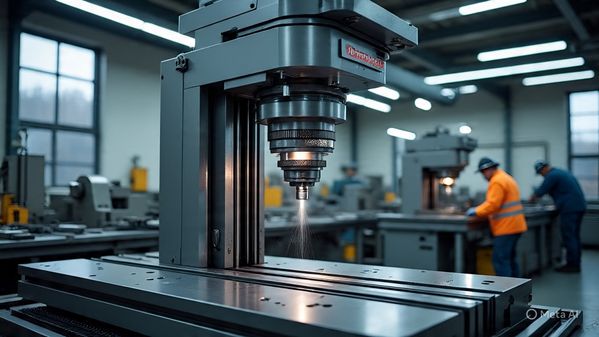Mitsubishi Precision: The Silent Giant Behind Aerospace and Defense Innovation
In a world obsessed with flashy consumer tech and trending start-ups, the name Mitsubishi Precision often flies under the radar—quietly powering some of the most critical systems in aerospace, defense, and industrial automation. Yet, if you’ve ever flown in a modern aircraft, relied on satellite navigation, or benefitted from smart industrial systems, chances are Mitsubishi Precision had a hidden hand in the process.
This post dives deep into the intricacies of Mitsubishi Precision—not from a promotional or superficial standpoint—but through a lens of practical expertise, real-world relevance, and decades of industrial trust. From avionics to defense systems, their story is one of relentless precision engineering, global partnerships, and cutting-edge research. Buckle up for an expert look into a company whose name might not be front-page news but whose impact reverberates through every radar sweep and navigation signal in the skies.
What Is Mitsubishi Precision?
Mitsubishi Precision Co., Ltd. is a specialized affiliate of the Mitsubishi Electric Group, primarily focused on the research, development, and manufacturing of high-precision electronics. Founded in 1962 and headquartered in Tokyo, Japan, the company stands as a cornerstone of Mitsubishi Electric’s advanced defense, aerospace, and industrial systems.
But don’t confuse it with Mitsubishi Motors or other Mitsubishi brands. Mitsubishi Precision is niche, highly technical, and fundamentally critical—serving a narrow but high-stakes market.
Core Areas of Expertise
-
Avionics and Flight Control Systems
-
Satellite Navigation and GPS Solutions
-
Radar and Defense Communication Systems
-
Image Processing and Motion Simulation
-
Factory Automation and Mechatronics
The Hidden Backbone of Modern Aviation
One of Mitsubishi Precision’s most vital roles lies in the avionics systems that power modern aircraft. These systems aren’t just about flying; they’re about flying safely, efficiently, and with minimal human error.
Flight Control: Precision in Every Microsecond
In commercial and military aviation, milliseconds matter. Mitsubishi Precision’s flight control computers—custom-designed for each aircraft type—process countless variables in real-time, including altitude, engine thrust, pitch, yaw, roll, weather interference, and terrain awareness.
What sets them apart is their triple modular redundancy system architecture—an engineering approach where three separate systems process the same data to prevent failure. This is the same safety protocol used in space shuttles and nuclear facilities.
Real-World Example: Japan Self-Defense Forces
For decades, Mitsubishi Precision has supplied mission-critical avionics to the Japan Air Self-Defense Force (JASDF), including their fleet of F-15J and F-2 fighter jets. Their software-defined flight computers support adaptive mission planning, threat detection, and automated diagnostics.
This isn’t speculation—it’s documented in technical procurement papers and government contracts, confirming Mitsubishi Precision’s trusted status in national defense.
Satellite Navigation That Goes Beyond GPS
While everyone relies on GPS, few know about Multi-GNSS (Global Navigation Satellite System) solutions. Mitsubishi Precision’s proprietary receivers integrate signals from GPS (US), GLONASS (Russia), Galileo (EU), QZSS (Japan) and BeiDou (China).
Why This Matters
-
Redundancy: If one system fails or is jammed (a frequent risk in wartime or cyber conflict), others back it up.
-
Accuracy: With five overlapping signals, positioning accuracy improves dramatically—from 5 meters down to 10 centimeters.
Use Case: Precision Agriculture & Autonomous Drones
Japan’s rice and vegetable farmers have increasingly adopted autonomous agricultural machinery, guided by Mitsubishi Precision’s GNSS modules. These systems can sow seeds and irrigate fields with centimeter-level accuracy, reducing waste and optimizing yield.
Radar Systems and Electronic Warfare
Mitsubishi Precision is a leading supplier of ground-based radar stations, battlefield communication networks, and even electronic countermeasure (ECM) systems—technologies used to jam, deceive, or evade enemy radar.
In 2023, the company unveiled its next-gen radar signal processor that integrates AI-based signal pattern recognition, significantly improving threat detection even in dense, jamming-heavy environments.
Image Processing & Simulation: Not Just for Pilots
Mitsubishi Precision’s motion simulators aren’t limited to aircraft pilot training. They’ve expanded into:
-
Railway simulators for urban rapid transit operators
-
Automobile testing for self-driving car developers
-
Ship navigation training for marine institutions
Their simulation platforms merge real-time image processing, inertial data analysis, and VR integration, making them one of the few global providers of multimodal transportation simulation technology.
Factory Automation: Quietly Reinventing Industry 4.0
While Mitsubishi Electric dominates headlines in smart factory systems, Mitsubishi Precision handles the ultra-specialized, high-fidelity precision controllers used in:
-
Semiconductor fabrication
-
Medical imaging equipment
-
Industrial robotics requiring nanometer accuracy
These systems often work behind-the-scenes, ensuring that entire production lines don’t deviate by even a fraction of a millimeter—a difference that could ruin microchips or precision lenses.
Innovation Through Collaboration
Academic Partnerships
Mitsubishi Precision actively collaborates with institutions like Tokyo Institute of Technology, contributing to joint research on next-generation inertial measurement units (IMUs) and quantum sensors.
International Defense Collaboration
Through its partnerships with global defense contractors, including Lockheed Martin and Thales, Mitsubishi Precission has contributed components to international missile defense systems, aircraft upgrades, and satellite launches.
The Unseen Standard-Bearer
What truly makes Mitsubishi Precision unique isn’t just its tech, but its culture of zero-failure engineering. In industries where human lives, national security, and millions of dollars are at stake, you don’t get second chances.
And that’s where Mitsubishi Precission shines. The company doesn’t chase the spotlight. Instead, it quietly upholds the unseen standards of modern precision systems—where failure is not an option, and every detail matters.
Mitsubishi Precision vs. Competitors
| Feature/Domain | Mitsubishi Precision | Honeywell Aerospace | Thales Group | Raytheon Technologies |
|---|---|---|---|---|
| Avionics | ✔️ Highly Specialized | ✔️ Widely Used | ✔️ Military-Grade | ✔️ Broad Spectrum |
| GNSS / Satellite Navigation | ✔️ Multi-GNSS | ❌ Limited | ✔️ Galileo Partner | ✔️ GPS-Focused |
| Radar Systems | ✔️ National Defense | ❌ Not Core | ✔️ Strong Presence | ✔️ Missile Defense |
| Motion Simulation | ✔️ Multi-Industry | ✔️ Aviation-Only | ❌ Limited Use | ❌ Not a Focus Area |
| Factory Automation Precision | ✔️ Nano-Level Control | ❌ General Systems | ❌ Not Applicable | ❌ Not Applicable |
Conclusion: Why Mitsubishi Precision Deserves Your Attention
In the vast Mitsubishi ecosystem, Mitsubishi Precision might be the quiet cousin—but make no mistake, it is the brains and backbone behind some of the world’s most critical systems. From making fighter jets fly smoother, satellites track better, and industrial robots move more precisely, their contributions ripple far beyond Japan’s borders.
They exemplify everything the modern world needs more of—substance over noise, reliability over flash, and precision over approximation.
If you’re a technologist, defense analyst, industrial engineer, or just a curious mind, Mitsubishi Precision is a name you’ll want to remember.
FAQs: Mitsubishi Precision
1. Is Mitsubishi Precision the same as Mitsubishi Motors or Mitsubishi Electric?
No. While all are part of the broader Mitsubishi Group, Mitsubishi Precision focuses on high-end electronics for aerospace, defense, and automation—very different from cars or consumer electronics.
2. Does Mitsubishi Precision make consumer products?
Not directly. Their technologies power commercial aviation, defense systems, and industrial machinery—but don’t expect to buy a Mitsubishi Precision-branded gadget.
3. What industries rely most on Mitsubishi Precision?
Aerospace, defense, transportation simulation, satellite navigation, and factory automation.
4. Is Mitsubishi Precision involved in space tech?
Yes. Their GNSS modules and avionics systems support both satellites and space missions, especially in collaboration with JAXA and Japanese defense contractors.
5. How accurate are Mitsubishi Precision’s GPS modules?
Their Multi-GNSS systems can achieve up to 10-centimeter accuracy, far beyond standard GPS.
6. Can Mitsubishi Precision’s motion simulators be used for commercial purposes?
Absolutely. They’re already used for commercial pilot training, autonomous vehicle testing, and even ship navigation courses in maritime academies.
Need help implementing precision automation in your operation?
Start by understanding the backbone technologies. Explore how Mitsubishi Precision systems can be integrated through specialized vendors or OEM partnerships in your industry.



